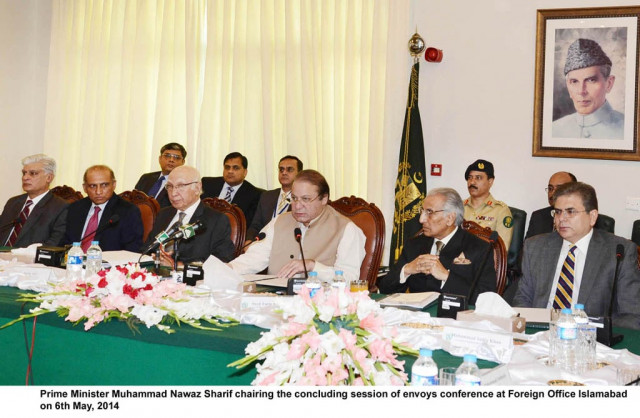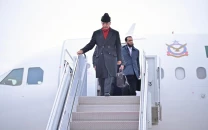Striking the balance: PM assuages concerns on Middle East policy
Nawaz Sharif says ties with one country will not be at the expense of another.

Prime Minister Nawaz Sharif chairing the concluding session of envoys conference at Foreign Office on May 6, 2014. PHOTO: PID
In a clear reference to Pakistan’s delicate relations with Saudi Arabia and Iran, Prime Minister Nawaz Sharif on Tuesday made it clear that his government’s efforts to seek increased cooperation with one country would not come at the expense of another.
“Pakistan has an equal aspiration to forge closer bilateral ties with all countries and our efforts to develop ties with one country are not and will not be at the expense of another,” the prime minister told a huddle of Pakistani envoys at the Foreign Office.

The three-day conference, attended by Pakistan’s ambassadors in Saudi Arabia, Iran, Syria, Yemen, Qatar, the UAE and other countries of the region, was part of ‘periodic consultations’ on key developments taking place in the Middle East.
ISI chief Lt Gen Zaheerul Islam and the director general military operations also briefed the envoys on the security aspects of Pakistan’s Middle East policy.
The prime minister’s remarks came just ahead of his maiden visit to Iran. The Islamic Republic is wary of Pakistan’s increased cooperation with Saudi Arabia. Speculations were rife that Islamabad was changing its Middle East policy, particularly on the Syria crisis, at the behest of Saudi Arabia, which recently ‘gifted’ Pakistan $1.5 billion in cash.
But the prime minister sought to dispel the impression and insisted that Pakistan would maintain a policy of ‘non-interference’ in the internal affairs of other countries, particularly in the Middle East.
“Let me take this opportunity to re-emphasise that Pakistan desires peace and tranquility in the Middle East. We will maintain our policy of non-interference, in the internal affairs of [other] states,” he said. “Our approach to the transition in the Arab world would continue to be guided by the principles enshrined in the United Nations Charter.”

In his wide-ranging address, the prime minister underscored that the defining principle of Pakistan’s foreign policy remained ‘peace for development’ i.e. building a peaceful external environment so that the core national objective of economic development could be advanced.
Outlining his vision and foreign policy priorities, he laid particular emphasis on building a peaceful neighbourhood, intensifying economic diplomacy, ensuring welfare of Pakistani diaspora, and projecting Pakistan’s positive image.
The prime minister urged the envoys to direct their efforts in enhancing and diversifying Pakistan’s trade and building cooperation in the areas of investment, energy, export of manpower and infrastructure.
He further underscored the importance of facilitating Pakistan’s expatriate community and utilising their potential.
Foreign Secretary Aizaz Ahmad Chaudhry briefed the prime minister on the discussions in the envoys conference and presented recommendations of the conference for implementing policy guidelines of the government and enhancing Pakistan’s ties with countries in the Middle East.
A Foreign Office official said that the envoys made specific proposals on how to pursue foreign policy in the Middle East. There was a consensus among the participants that Pakistan should not become a direct party in the Syrian conflict at the behest of any country, the official told The Express Tribune requesting not to be named in the report.
They also suggested the government ensure a balance in its relationships with Saudi Arabia and Iran, which are at odds with each other on the issue of Syria. “The prime minister’s address is reflective of the recommendations formulated by the envoys,” the official added.
Published in The Express Tribune, May 7th, 2014.



















COMMENTS
Comments are moderated and generally will be posted if they are on-topic and not abusive.
For more information, please see our Comments FAQ